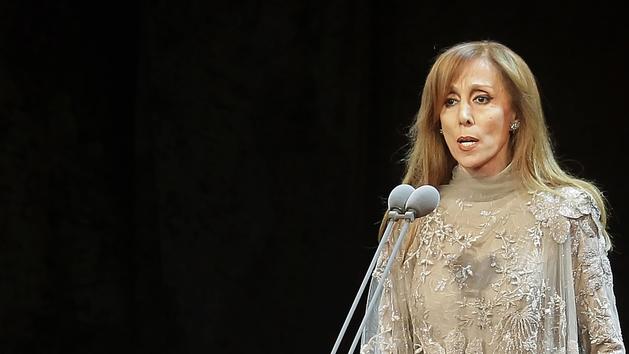The last living legend of Arab song, Fairouz, whom French President Emmanuel Macron meets on Monday evening, transcends the powerful confessional divides in Lebanon and remains a rare symbol of national unity of a century-old country more than ever sick of its fractures.
Read also: Lebanon: President Aoun calls for declaring Lebanon a "secular state"
Since the death of Egyptian diva Oum Kalthoum in 1975, no Arab singer has reached the level of adulation of 84-year-old Fairouz, who extolled love, freedom, his native Lebanon and Palestine. The embodiment of the golden age of a prosperous and culturally rich Lebanon, Fairouz, a pseudonym which means " turquoise " in Arabic, is a rare national glue.
After performing for more than half a century from Beirut to Las Vegas, via Paris and London, it has walled itself for more than a decade in deep silence.
Seraphic voice, heavenly
" When you look at Lebanon today, you see that it bears no resemblance to the Lebanon that I sing about, " the diva however regretfully affirmed in an interview with the New York Times in 1999, referring to decades of war and destruction. .
Despite his silence, his seraphic, heavenly voice still resonates on Arab radios. Very discreet, Fairouz, whose real name is Nouhad Haddad, has given extremely rare interviews during his career.
“ If you look at my face when I sing, you will see that I am not there. I think art is like prayer, ”she confides in one of these interviews, saying that she is“ very believing ”.
Her motionless posture, her face almost in a trance when she sings, her timid smiles quickly repressed, her sober wardrobe, accentuated her almost mystical stature with the public.
From the top of her pedestal, this mother of four has never opened up about her private life. “ In reality, she is far from the image of cold Madonna that she projects on stage. It is only shy and serious. She loathes vulgarity and invasion of her private life, ”according to journalist Doha Chams, her closest collaborator. “ When she wants to, she can be very funny. She is also a distinguished cook. Very humble, she likes to serve her guests herself, ”according to her.
"Unique school"
The eldest of four children, Fairouz, born in 1934 into a Christian family, spent her childhood in Beirut before being spotted at school. Engaged in the radio, the composer Halim al-Roumi, impressed, gives her his nickname and presents her to the Rahbani brothers.
In the 1950s, she married the composer Assi Rahbani who, with his brother Mansour, revolutionized traditional Arab song and music by mixing classical Western, Russian and Latin American pieces with oriental rhythms, on a modern orchestration.
Read also: Explosions in Beirut: singer Khaled releases an unprecedented song to help Lebanon
It was after his first concerts at the Baalbeck International Festival, in the middle of the ruins of this ancient Lebanese site, that Fairouz's career took off.
She gave life to the words of great Arab poets - the Lebanese Gibrane Khalil Gibrane, Saïd Akl or the Egyptian Ahmed Chawki - while her patriotic songs are embedded in the memory of the Lebanese and the rest of the Arab world. She also shone in a dozen operettas and in the cinema - like The Seller of rings (1965) by Egyptian director Youssef Chahine.
If Fairouz sits as queen of Arab song, it is also because she sang of the Palestinian cause, especially with Sa Narjeou Yawmane (“ We will come back one day ”), an elegy calling out to Palestinian refugees. She dedicates another song, The Flower of the Cities , to Jerusalem, after the defeat of Arab troops against Israel in 1967.
In Lebanon, the public's respect for her reached its peak during the civil war (1975-90), when she refused to go into exile or to take sides.
" I love you O Lebanon "
“ I love you O Lebanon, my homeland I love you. With your north, your south, your valley, I love you ”, she sings in one of her most famous songs ( Bhebbak ya Lebnane ), notably at the Olympia in 1979, arousing the tears of the crowd. .
She performed in her first post-war concert in central Beirut, in front of tens of thousands of crying Lebanese. Adored by seniors, she becomes the icon of young people when her son Ziad, enfant terrible of Lebanese music, composes songs for her influenced by jazz rhythms.
Over time, some controversies caught up with her: in 2008, when Lebanon was divided between pro and anti-Syrian regimes, Fairouz caused an uproar by performing in Damascus, the cultural capital of the Arab world that year.
A long copyright dispute pitted him against the sons of Mansour Rahbani, preventing him from singing his most famous songs. In 2017, his daughter Rima who films and stages his concerts produced his last album, Bibali .

